Whether it’s crawling, cruising, walking, talking or potty training, there is no normal when it comes to babies. Here we look at how to avoid worrying and comparing your little one to others – so you can be content with the pace of their development
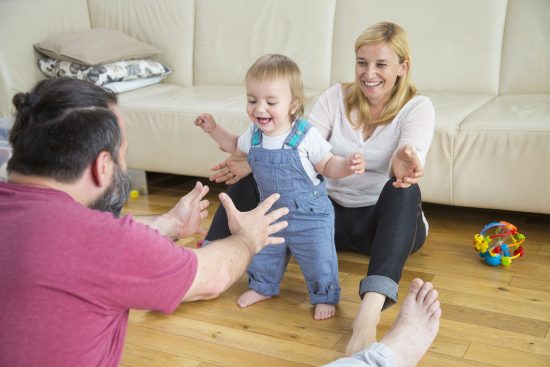
Some of the most exciting and exhilarating moments of parenthood are when your baby learns a new skill.
Of course, you can’t help but feel proud and in awe of what your little person has mastered.
But baby milestones can also be a source of anxiety as you can’t help but wonder if they’re developing ‘normally’ and learning skills when they should.
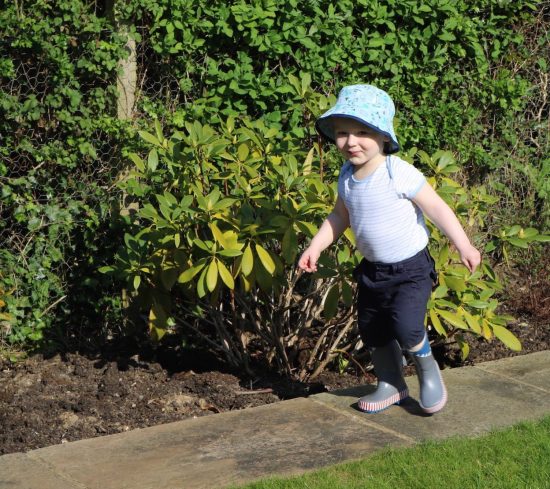
Melanie Coleman, mum to William and Jessica, explains her son was the slowest to reach any physical milestones out of all the babies in her NCT group.
‘He didn’t crawl until nearly 15 months and didn’t walk until he was 20 months. It became a running joke among friends. They’d say “What? He’s still not walking” every time I saw them’.
‘When I looked at other babies I realised my son was poles apart. The fact he was the last baby in our NCT group to be born and he was reluctant to get mobile meant he walked nearly a year after some of the other babies who were early movers.’
She adds: ‘At times it was tricky because they were onto the next stage of toddlerhood while we were still stuck in the baby phase.’
We’ve said it many times before, but every baby is different!
Your baby will learn a new skill when they’re ready – and no amount of obsessing or worrying from you will make them do the task in hand any quicker.
In an article called Cherishing differences: Why babies are not all alike, Professor Angelica Ronald says: ‘Sometimes this focus on milestones can imply all babies should be the same. It can be easy to forget that babies are individuals, just like children and adults.’
‘We wouldn’t expect all adults to like the same food, sleep at the same hours, or behave the same way. In many ways the same applies to babies too.’

It can be helpful to think of it as though your baby has their own set of priorities.
Fiona Forbes-Hamilton, mum to Jake and volunteer with Redhill, Reigate and Horley NCT branch, says: ‘My baby took his first steps the day he turned nine months old.’
‘But he was over a year before he clapped his hands, which was way behind his little friends. I think he has his own priorities and was focused on getting mobile.’
Even twins or siblings can be very different in their timeframes for learning new skills.
Although it’s natural to compare your little one to babies of a similar age, it’s not always helpful.
Suzy Morgan, mum to Poppy and volunteer with Cumbria NCT branch, says: ‘It’s best to try and let all the “should be” things wash over you and remember not everything you read on the internet is true. But listen to health visitors if you do have a concern.’
Professor Angelica Ronald adds: ‘Our babies are individuals on their own journey. We all like to be accepted for who we are – and babies are no exception. Keeping track of what our baby is like is a better use of our energy than comparing them to others.’
It’s easy to feel impatient and question whether your baby will ever get to grips with a new skill, but rest assured it will happen.
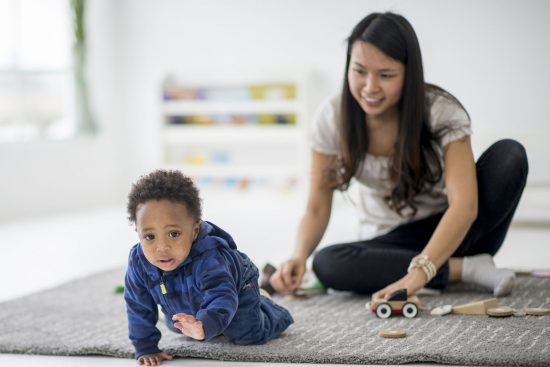
After all just think about most adults – they can walk, talk, sleep, use the toilet, eat solids and drink more than just milk – so at some point in their early life they mastered these skills.
Their parents probably agonised over when they’d do all of these things too.
And while it seems so important now, in a few years’ time you’ll barely remember any of the anxiety you felt. (Your memory might even be sketchy over when they did finally crawl, walk, talk or potty train.)
So try to stay patient. It’s better to leave them to master the current stage of development rather than push them onto the next milestone.
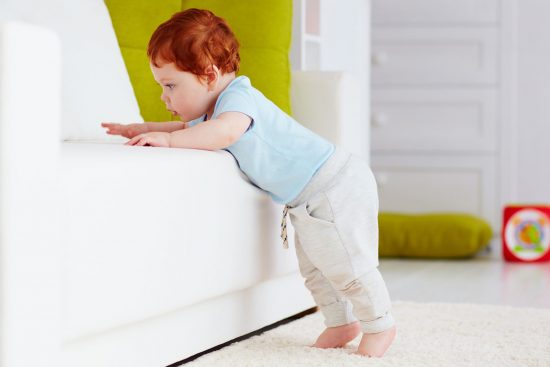
Melanie explains that, despite her son’s reluctance to get mobile, she trusted her instincts.
‘Other people’s comments did make me worry a bit and I did speak to the health visitor, but deep down I knew there was nothing really wrong. He was just a bit lazier than other babies!’
She adds: ‘My second baby isn’t crawling properly or showing any signs of walking at 12 months, but we’re in no rush. She’ll do it when she’s ready, just as my son did.’
Meeting milestones later doesn’t mean your child will be at a disadvantage. A Swiss study that tracked more than 200 children found babies who had started walking early turned out no more intelligent or well-coordinated than their peers later on.
Helen Perry, mum to James and member of Stourbridge and Halesowen NCT branch, says sometimes it’s best not to do too much research on development.
‘I have genuinely no idea whether my 17-month old son has been early or late with things as I’ve tried to steer clear of articles about what he should be doing. We’re just happy when he learns new things.’
Also remember you might not always be getting the full picture from other parents. They may say their 12-month old is talking but to anyone else the words will be indecipherable.
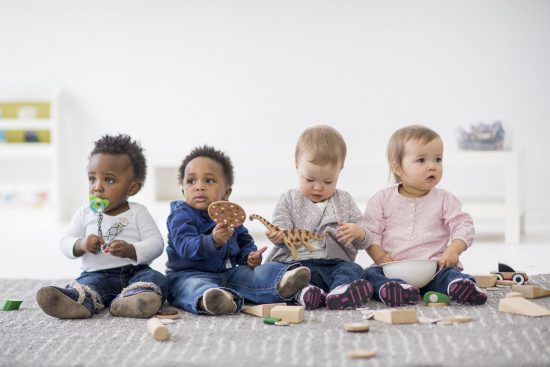
Or they might say their 22-month old is potty trained but in reality this might mean they have numerous accidents each day.
Sometimes you’ll need to take things you’re told with a pinch of salt.
Melanie says: ‘If you lined up all the children in our NCT group now you’d never know who walked or talked the first – their development all evens out in the end’.
Try to look at
the benefits of whatever stage you and your baby are at
right now
Melanie says there were some positives to her son’s reluctance to get mobile.
‘In hindsight, it was great because once he did start walking he rarely fell over and could manage relatively long distances soon afterwards without getting tired.’
‘Also it meant I had much longer before he was emptying drawers or trying to climb on furniture! Plus he finally took those long-awaited first steps on Mother’s Day in front of lots of family members, which made it even more special.’
Equally, if your child is early to crawl or walk, look on the bright side and make the most of not having to carry them everywhere.
If you are worried about your little one’s development and feel like there could be something wrong, do of course contact your health visitor or GP.

If you’re unsure of whether to seek help or not, the NHS advises you to have a chat to your health visitor or GP if your six-month old baby isn’t:
The NHS also advises that you speak to a health visitor or GP if your baby isn’t able to sit unsupported by nine months and isn’t walking by 18 months.
It may be nothing to worry about but they’ll be able to put your mind at rest.
Development reviews
Your child will be offered a health and development review around their first birthday and again when they’re two. These reviews are to support you and your child and you’ll get a chance to talk about their health and development and raise any concerns. You may be sent a questionnaire beforehand so you can try out different activities with your little one and see how they manage.
Some parents find that their little one goes through an unsettled patch around the time they’re learning a new skill.
The Wonder Weeks says that during these times, which they call developmental leaps, a baby’s ability to understand the world around them is changing. So they may be more cranky, clingy, fussy, cry more, lose their appetite, wake more or take extra time to go to sleep.
This can be tough for parents, but bear in mind they usually get back to feeling themselves fairly soon – with the added bonus of having a new skill under their belt.
Understanding what they’re going through and why they’re more fussy can be helpful.
Also sometimes your baby may seem to lose a skill due to concentrating on gaining a new ability. Once they have mastered the new skill, you will see that the old ones are still present.
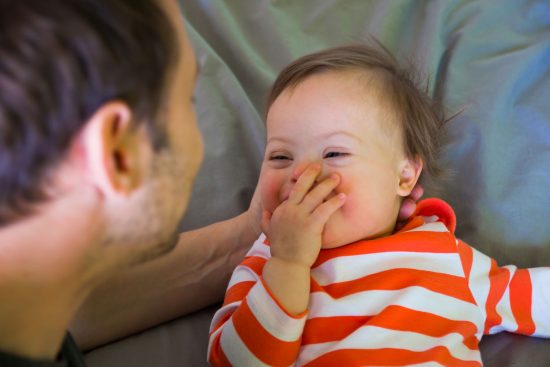
If your child has a developmental issue or a disability, whether diagnosed or undiagnosed, it’s sometimes hard to know how best to support them.
There is help available – speak to your GP or health visitor and they should be able to tell you about resources and support you can access to help both you and your little one.
Also try to look at the abilities your child has in other areas and seek out activities that will enhance those skills, for example, if walking or running is challenging, think about swimming, yoga, or music classes.
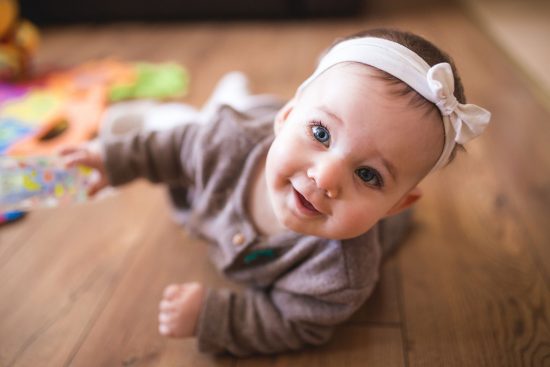
As clichéd as it sounds, time really does go quickly.
Try to enjoy the ‘here and now’ with your baby rather than always looking forward to the next milestone.
And remember they decide when the time is right and they’ll get there under their own steam.
The NHS has the following birth to two years development timeline:
The ages given are averages and many children will gain one skill earlier or later than another.
For more on your baby’s development click here.
To read about physical milestones click here.
Make friends with other parents-to-be and new parents in your local area for support and friendship by seeing what NCT activities are happening nearby.
You might find attending one of NCT’s Early Days groups helpful as they give you the opportunity to explore different approaches to important parenting issues with a qualified group leader and other new parents in your area.